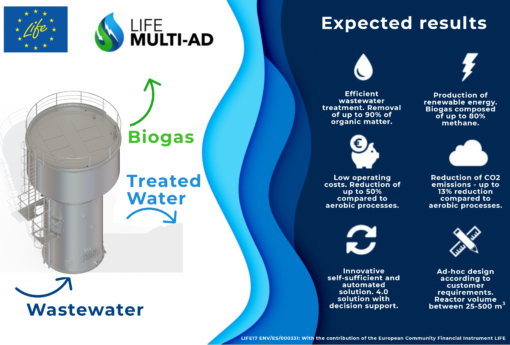The relationship between innovation, water and food processing is key to the competitive and sustainable management of the food and beverage industry. Leading companies in the sector, such as Bodegas AGE, demonstrate the commitment of the agri-food sector to R&D&I and sustainability through their collaboration in the LIFE Multi-AD project.
Efficient water management is one of the main challenges facing the agri-food industry in 2030. It is not only a question of wastewater treatment, society, increasingly committed to the environment, and legislative measures, demand a responsible and sustainable use of water resources.
In the coming years, the competitiveness of the food and drink industry will depend to a large extent on its ability to meet the main sustainability challenges. The scarcity of resources such as water is becoming a major concern, which requires the development of technological solutions to increase efficiency in its use.
Technological innovation: a strategy for sustainability and competitiveness
Technological innovation is the main tool for guaranteeing the sustainability and competitiveness of companies. Innovation and technology enable more efficient management of water and natural resources, increasing the resilience of companies.
The involvement of the agri-food industry in the fulfilment of the Circular Economy Action Plan presented by the European Commission, as well as the Sustainable Development Goals (SDGs) and the United Nations 2030 Agenda, requires companies to go beyond the conventional and invest in technology and innovation applied to the environment.
Research, technology development and innovation can play a key role in proposing solutions that allow companies to move from a linear economic model to a more circular one and, therefore, become drivers in the development and strengthening of the circular economy.
The food and beverage industry is aware of this fact and therefore continues to be committed to R&D&I. Clear evidence of this is the 3rd Strategic Innovation Plan of the Wine Technology Platform (PTV), which includes more than 60 projects in which the subsector is involved. Among these initiatives is, in the area of Sustainability and Climate Change, the LIFE Multi-AD project.
LIFE Multi-AD technological solution
The LIFE Multi-AD project is developing and industrialising a fully automated system for the treatment of wastewater generated by small and medium-sized enterprises (SMEs) in the agri-food sector. The technological solution will improve the sustainability of food SMEs, valorising the organic load of the wastewater by producing biogas, which will be used as a renewable energy source, thus saving natural resources and reducing the Carbon Footprint.
The European LIFE Multi-AD initiative is based on the ad-hoc design of a high performance multi-stage anaerobic reactor, patented by AEMA, whose first unit will be installed in Bodegas AGE (Fuenmayor, La Rioja). This anaerobic reactor, with daily capacity to treat up to 120 m3 of wastewater, produce up to 250 m3 biogas and generate about 1,700 kWh of renewable energy, will be operated for 18 months in order to demonstrate the technical, economic and environmental feasibility of the technological solution.
The LIFE Multi-AD project is 60% supported by the LIFE+ ENVIRONMENT programme of the European Commission and is coordinated by AEMA as an expert in wastewater treatment technologies. It also involves ITAINNOVA, a technological centre of reference in technological innovation; SIS, a company that provides solutions in the field of industrial automation; EGA, a specialist in the management and recovery of organic waste through anaerobic digestion, and I&S, a consultancy and communication agency. In addition, the consortium has the collaboration of Bodegas AGE, a winery committed to sustainability and respect for the environment.


